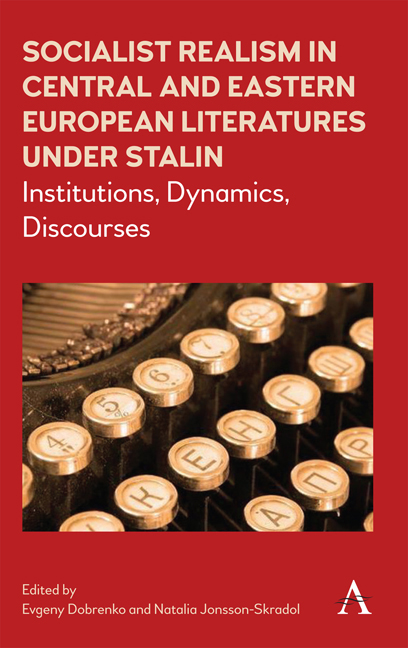 Socialist Realism in Central and Eastern European Literatures under Stalin
Socialist Realism in Central and Eastern European Literatures under Stalin Book contents
- Frontmatter
- Contents
- Acknowledgements
- Introduction
- Part 1 Institutions
- Part 2 Dynamics
- Part 3 Discourses
- 15 Introducing Socialist Realism in Hungary, 1945– 51: How Politics Made Aesthetics
- 16 When Writers Turn against Themselves: The Soviet Model and the Bulgarian Experience, 1946–56
- 17 Big Brother's Gravity: East European Literature in the Mirror of Soviet ‘Thick Journals’ in the Late 1940s
- 18 The Coming One: Prolegomena to the Positive Hero of Czech Socialist Realism as a Transforming and Transformed Subject
- 19 Will Freedom Sing as Beautifully as Captives Sang about It? Reshaping the Croatian Canon, 1945–55
- 20 The Salon in the Camp: Friendship Societies and the Literary Public Sphere in the SBZ and Early GDR
- Conclusion
- List of Contributors
- Index
18 - The Coming One: Prolegomena to the Positive Hero of Czech Socialist Realism as a Transforming and Transformed Subject
from Part 3 - Discourses
Published online by Cambridge University Press: 10 May 2018
- Frontmatter
- Contents
- Acknowledgements
- Introduction
- Part 1 Institutions
- Part 2 Dynamics
- Part 3 Discourses
- 15 Introducing Socialist Realism in Hungary, 1945– 51: How Politics Made Aesthetics
- 16 When Writers Turn against Themselves: The Soviet Model and the Bulgarian Experience, 1946–56
- 17 Big Brother's Gravity: East European Literature in the Mirror of Soviet ‘Thick Journals’ in the Late 1940s
- 18 The Coming One: Prolegomena to the Positive Hero of Czech Socialist Realism as a Transforming and Transformed Subject
- 19 Will Freedom Sing as Beautifully as Captives Sang about It? Reshaping the Croatian Canon, 1945–55
- 20 The Salon in the Camp: Friendship Societies and the Literary Public Sphere in the SBZ and Early GDR
- Conclusion
- List of Contributors
- Index
Summary
When we feel anxious, you are always near. We must not forget that you are here, but we cannot make a habit out of it. We have to do at least something on our own.
(Václav Řezáč, The Offensive)Introduction: The Chosen Heirs of National Traditions
Looking at the most influential manifestos of socialist realism in Czechoslovakia after the communist takeover in 1948, one may come to the conclusion that it was poetry that occupied a privileged place in the literary policy of the new regime. In his presentation at the preliminary conference of the Czech Writers’ Union in 1950 Ladislav Štoll, a key figure of post- 1948 cultural politics, literary historian and renowned communist official – aiming to give a more precise formulation to the official Party conception of the new literature – touched upon the development of socialist poetry over the previous 30 years. In this speech, published a few months later under the title ‘Třicet let bojů za českou socialistickou poezii’ (‘Thirty Years of Fighting for Czech Socialist Poetry’, 1950), Štoll turned to poetry as material for constructing a new narrative of the historical development of Czech culture and society. The second keynote speech of the conference, given by another member of the new cultural establishment, the poet, translator and literary critic Jiří Taufer, was an aggressive attack against what the speaker considered to be regressive, decadent and pornographic tendencies of contemporary culture, and aimed directly at poets like realist Jiří Kolář and his colleagues.
Yet when we turn to official models for Czech socialist realism, we find among them many influential Soviet novels such as Fadeev's The Young Guard, Pavlenko's Happiness or Azhaev's Far from Moscow. Of course, the Czech authorities fully accepted the Soviet canon, from Gorky's Mother and Gladkov's Cement, with its heroic thrust, to contemporary ‘instant classics’ of post- war fiction.
- Type
- Chapter
- Information
- Socialist Realism in Central and Eastern European Literatures under StalinInstitutions, Dynamics, Discourses, pp. 297 - 318Publisher: Anthem PressPrint publication year: 2018


